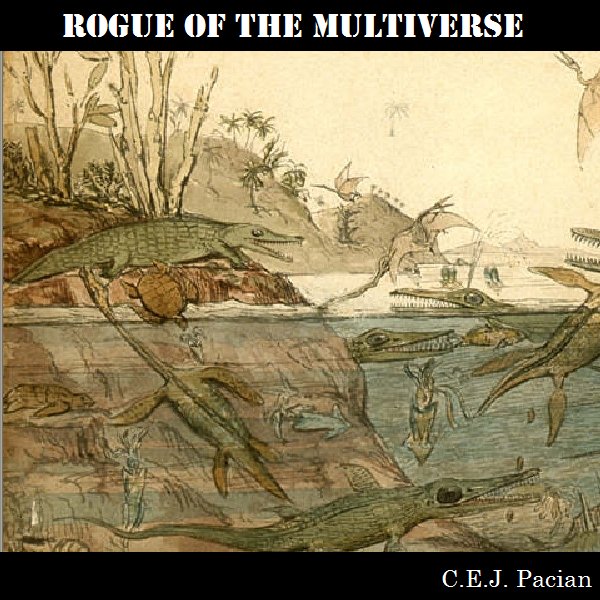“Rogue of the Multiverse” by C.E.J. Pacian
Congratulations, convict 76954! You have been selected for scientific experimentation! You will be matter-transmitted to exotic non-Treaty worlds – where opportunities abound to take in fantastic sights and mingle with colourful locals!
This sounds like a randomly generated roguelike in IF format. As the only TADS game in this competition, that seems like a possibility. It does clock in at a pretty hefty 790KB. If I’m right, this game could be the polar opposite of the last one I reviewed: Heavy on the interaction, light on the fiction. Let’s find out; spoilers!
How wrong I was! This is not a roguelike, not hardly. While it does feature some randomly generated content in the middle, it’s very formulaic; it seems to be an infinite grid of rooms, where you look for the big blips on your scanner and steal stuff, while avoiding the little blips on your scanner. The game gives each random locale a different coat of paint, but essentially they’re all the same; it’s a mundane task to make money.
Much of the game is explicitly railroaded, so far that the player’s only choice is to type forward to advance to the next scene. Then there’s a mild puzzly bit in the middle where you help a worm living in the toilet to build a communicator by purchasing furniture for it.
Let’s put it this way; the game is in five ‘acts’:
- Prison
- The Interview
- Missions/Helping the Worm
- The Escape
- Finale 1 or Finale 2
Acts 1, 2, 4 and 5 are pretty much linear, though to their credit they mix up the verbs for how you advance the plot. In act one you mostly type. “forward.” In act two you mostly type “yes” or “no.” In act four you mostly type “accelerate.” In act five you mostly type “forward” again, regardless of which ending you got.
Act three is the longest, and it breaks down into a cycle of “go to randomly generated void to make money” and “buy furniture for the worm in the toilet”. Fortunately, it seems the author realized that this was not the most engaging mechanic, and it only took me three missions to make enough money to escape to act four. There’s not really any puzzling to be done here, but that’s clearly not what this game is about. I did find talking to the worm a bit frustrating; once he told me what stuff he needed, I had a hard time getting the list out of him again, and since I had saved the game and come back to it this was a problem.
I think my greatest disappointment is this: For a game that has randomly-generated content and asks the player an incredible number of questions, there are only two endings, and those are determined by a last-minute decision at the end of act four. My expectations of something with the openness of a roguelike were entirely undermined.
Enough negative comments. After all that, I have to admit that the fun factor for this game was higher than you would think. In place of the freedom I expected, you get a decent little sci-fi plot with a comical sci-fi setting. Lots of aliens, dismemberment a non-issue, a jet-bike getaway, the works. The action sequences are pretty good, and while I don’t think this does action-IF as well as last year’s Duel that Spanned the Ages, it gets the job done. Your shifting relationship with the characters of Sliss and the worm gave me something to think about in the middle of a very linear plot. The parts of the game that could’ve gotten dull never lasted too long, so there’s some very good design going on here.
On the whole the game does a lot, but doesn’t do any one thing superbly. It was enjoyable, but there’s room for improvement. I will check out this author’s other works.
Verdict: B
